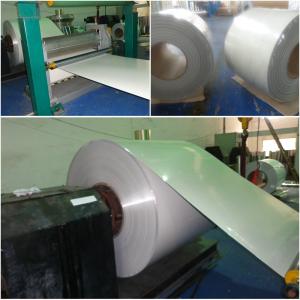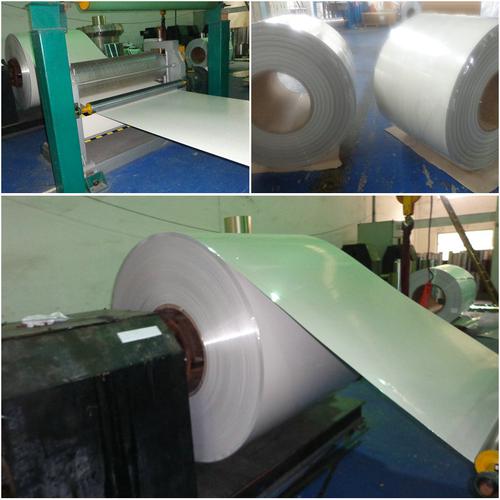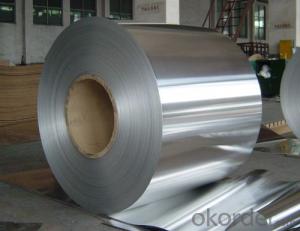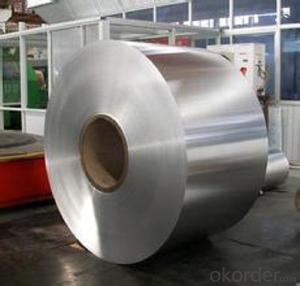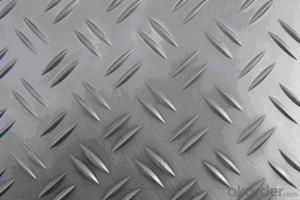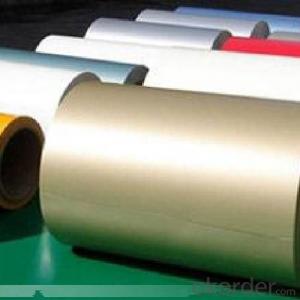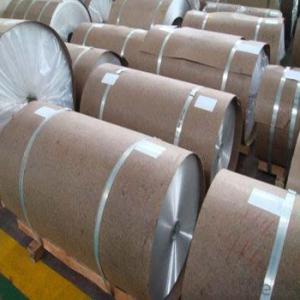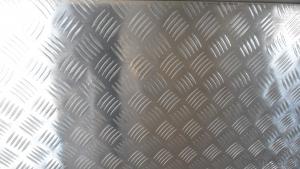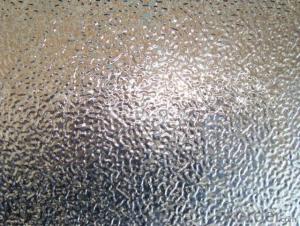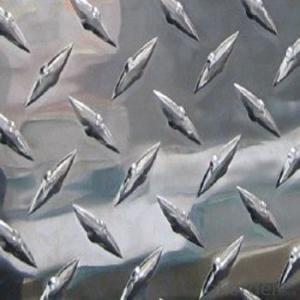Coated Aluminum Coils - Embossed Aluminum Coating Coil Sheets
- Loading Port:
- China Main Port
- Payment Terms:
- TT OR LC
- Min Order Qty:
- -
- Supply Capability:
- -
OKorder Service Pledge
OKorder Financial Service
You Might Also Like
Embossed color coatedaluminum coil
the company can produce the aluminum coil pattern are: classic orange peel pattern,and variation orange peel pattern (also called as bugs’ pattern). Thicknessspecification is 0.2mm ~ 0.6mm, width less than 1600mm. The materials used arefluorocarbon coated aluminum, polyester coated aluminum coil, aluminum roll,light aluminum, brushed aluminum rolls.
By embossing the surface of aluminum coil elegant, streamlined good, solidsense. Embossed aluminum coil aluminum coil can not only increase the thicknessof the aluminum coil thickness of 0.1 ~ 0.25mm. At the same time can enhance thestrength of aluminum coil, stiffness, and does not affect the original surfacelayer of the aluminum coil with the performance.
Embossed aluminum coil, wide range of uses. Mainly used for indoor and outdoordecoration, freezer, refrigerator, decorative aluminum products, bags, centralair conditioning and ventilation nozzles, and mechanical equipment enclosuresand so on. Is a new decorative material.
Thecompany has two production lines embossed aluminum coil: one for the simpleformula: put through Unwinder mechanical embossing roll winder windingembossed, convenient and quick. Another is the compound: that is embosseddirectly into the device placed in the coating line, coating and embossingsynchronization, when the coating needs of embossed aluminum coil, through thehydraulic transmission, the embossing machine, under the pressure rollerengagement, aluminum coating line directly in the embossing roll, fast, lowcost, no turnover.
Thickness range
0.2mm—0.6mm
Width range
800mm—1590mm
Technical parameters
Aluminum thickness | Coating thickness | MEK | T-bend | Impact | Adhesion | Pencil hardness | Boiling water proof |
0.20-0.60mm | ≥18±1um | ≥100times | ≤3T | 50kg.cm | 0grade | ≥HB | no change within 2 hours |
Performance and Application
Embossed aluminumcoil for roofing is coated with high-performance polyester paints. And its eachperformance index is up to or exceeds the national standard. With its gloriouscolors, little chromatism, strong impact and easy machinability, the productserves as a premium material in roofing, electric appliances, etc.
- Q: What precautions should be taken while using tools for handling aluminum coils?
- <p>When handling aluminum coil tools, it's crucial to follow safety measures to prevent accidents. Always wear appropriate personal protective equipment (PPE) such as gloves, safety glasses, and closed-toe shoes. Ensure the tools are in good condition and well-maintained. Keep the work area clean and free of debris to avoid slips or trips. Be cautious of sharp edges on the aluminum coils, as they can cause cuts. Use lifting equipment when necessary and never attempt to lift heavy coils manually. Follow all manufacturer guidelines for the safe operation of the tools. Regularly inspect the tools for any signs of wear or damage and replace them as needed.</p>
- Q: Are aluminum coils suitable for electrical conductivity?
- Yes, aluminum coils are suitable for electrical conductivity. Aluminum is a highly conductive material that has a conductivity rating of approximately 62% of the International Annealed Copper Standard (IACS). This makes aluminum coils an excellent choice for various electrical applications, including power transmission and distribution, electrical motors, and transformers. Additionally, aluminum coils offer advantages such as lightweight, high corrosion resistance, and lower cost compared to copper coils. However, it is important to note that aluminum has a lower conductivity than copper, so larger aluminum coils may be required to achieve the same level of conductivity as smaller copper coils. Overall, aluminum coils are a viable and commonly used option for electrical conductivity.
- Q: I'm wondering if there is a resin/molding material that can withstand the heat of melted aluminum for casting parts. I know that sand casting is the 'norm' but is there anything else? I'd rather not have to pack sand every time I want to cast a part.Thanks!
- One common mold material for metal casting is plaster mixed with silica sand to give it more strength. It needs to be completely (like heated) dry before you use it, but it is actually more work than sand casting but it gives a better finish. There are some rubber materials which can withstand the heat of casting pewter, but the melting point of pewter is so much lower than aluminum that I am sure those won't work for aluminum. I think you are pretty much stuck with sand for the easiest method.
- Q: The user is asking if there are any recycling programs specifically for aluminum coil in their country.
- <p>Yes, many countries have recycling programs for aluminum coil. These programs aim to collect and recycle aluminum coils to reduce waste and conserve resources. The availability and specifics of these programs can vary by country, so it's best to check with local waste management authorities or recycling centers for information on programs in your area. Some countries also have legislation mandating recycling of certain materials, including aluminum, to encourage participation and reduce environmental impact.</p>
- Q: This question asks for a method to compact an aluminum coil by folding it.
- <p>To fold an aluminum coil for compactness, first ensure the coil is free of sharp edges or damage. Use gloves for safety. Start by laying the coil flat. Measure and mark the desired folded length. Begin folding the coil by bringing one end towards the center, aligning the edges neatly. Continue folding back and forth, ensuring each fold is tight and even. Use a rubber mallet or similar tool to secure the folds, if necessary. For larger coils, consider using a mechanical folder or press to apply even pressure. Always work in a well-ventilated area and follow safety guidelines to prevent injury.</p>
- Q: How are aluminum coils used in heating, ventilation, and air conditioning (HVAC) systems?
- Aluminum coils hold a vital role in HVAC systems, specifically in heating, ventilation, and air conditioning. These coils are implemented in both the condenser and evaporator parts of the system. In the condenser, the aluminum coils aid in the transfer of heat from the refrigerant to the surrounding air. The refrigerant, which is in a state of high pressure and temperature after compression, flows through the condenser coils. As the air from the surroundings passes over these coils, the heat from the refrigerant moves to the air. This procedure contributes to the cooling of the refrigerant, transforming it from a gas into a liquid state. The cooled liquid refrigerant then moves to the evaporator coil. In the evaporator, the aluminum coils help in the absorption of heat from the indoor air. The liquid refrigerant enters the evaporator coils, where it experiences a change in phase from liquid to gas. As the warm indoor air passes over the coils, the refrigerant absorbs the heat, resulting in the cooling of the air. This cooled air is subsequently circulated back into the room, creating a comfortable indoor environment. The preference for aluminum coils in HVAC systems stems from their outstanding thermal conductivity, resistance to corrosion, and lightweight properties. These characteristics ensure effective heat transfer and enhance the overall performance of the system. Moreover, aluminum coils are more cost-efficient and environmentally friendly compared to materials like copper. Regular maintenance and cleaning of the aluminum coils are imperative to maintain their optimal functioning. Over time, dirt, dust, and debris can accumulate on the surface of the coils, hindering heat transfer and reducing efficiency. Thus, periodic cleaning is essential to preserve the performance of the HVAC system and prolong the lifespan of the aluminum coils.
- Q: Are aluminum coils suitable for roofing?
- Yes, aluminum coils are suitable for roofing. Aluminum is a lightweight and durable material that is resistant to corrosion, making it an excellent choice for roofing applications. It is also highly reflective, which can help to reduce energy costs by keeping the building cooler. Additionally, aluminum coils are easy to install and maintain, making them a popular option for both residential and commercial roofing projects.
- Q: Is it possible to utilize an electric iron that features an aluminum coil heater?
- <p>Yes, you can use an electric iron with an aluminum coil heater. Aluminum coil heaters are commonly used in electric irons due to their excellent heat conductivity and quick heat-up time. They distribute heat evenly and maintain a consistent temperature, making them ideal for ironing. However, it's important to follow the manufacturer's guidelines for use and maintenance to ensure safety and longevity of the iron.</p>
- Q: Can aluminum coils be welded or joined?
- Yes, aluminum coils can be welded or joined. Aluminum welding involves melting the edges of the coils and fusing them together using a welding technique such as TIG (Tungsten Inert Gas) or MIG (Metal Inert Gas) welding. Aluminum can also be joined by other methods like brazing or soldering.
- Q: Normal aluminum like you find in the ground, not the man made stuff
- As rowlfe said, aluminium does not exist free in nature. There are quite a number of minerals and compounds containing aluminum that are phosphorescent, though--there is a long list in the link below. The primary ore of aluminum is bauxite, but I don't think it is typically phosphorescent though it may be under certain circumstances. . Technically, aluminum is not man-made, so be careful using that term. All aluminum in existence is created in supernova explosions during star death. (This IS the Astronomy Space forum, after all.) All pure aluminum metal is *refined* by man, but the element itself isn't man-made. (There are some transuranic elements such as plutonium that do not exist in nature and have only been made by humans, so the point is relevant though perhaps not pertinent to your question. Aluminum isn't one of them, though.) . Edit: If you don't learn what you want here, you might consider reposting this question in the Geology section. That bunch probably knows more about minerals and such than the Astronomy Space crowd does.
Send your message to us
Coated Aluminum Coils - Embossed Aluminum Coating Coil Sheets
- Loading Port:
- China Main Port
- Payment Terms:
- TT OR LC
- Min Order Qty:
- -
- Supply Capability:
- -
OKorder Service Pledge
OKorder Financial Service
Similar products
Hot products
Hot Searches
Related keywords
